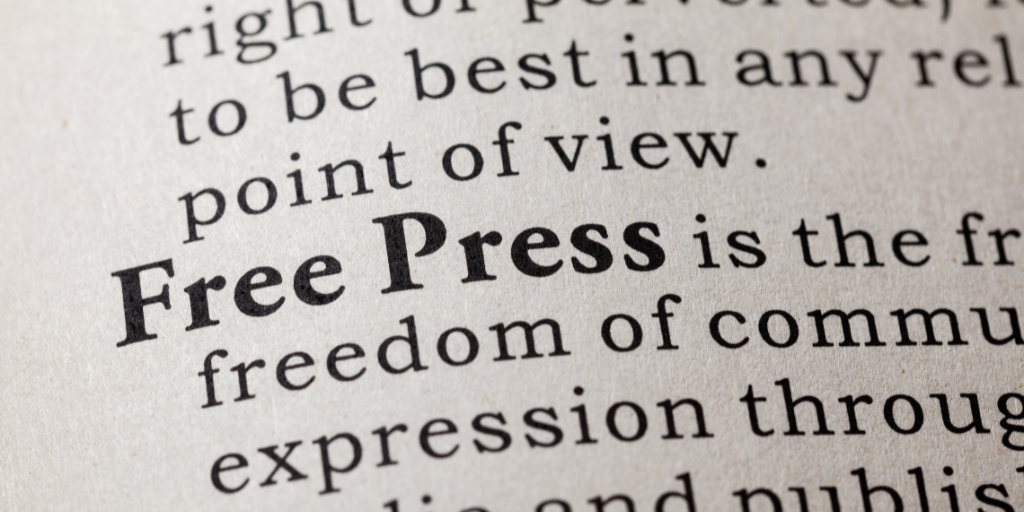
In recent months, judicial attacks on the freedom of expression of journalists, activists, and NGOs have multiplied in France and represent a serious threat to public debate and democracy. These proceedings take place while the European Union has begun to work on a proposed directive to combat SLAPP proceedings. The petitioners highlight the importance of this text, and call on France to give it clear and ambitious support.
While French businessman Vincent Bolloré has long been acknowledged as an « expert » in SLAPP suits – systematically attacking any embarrassing revelations concerning his group’s activities – others have recently taken up the baton.
On April 28, 2023, TotalEnergies took Greenpeace France to court over the publication of a report questioning the company’s calculations of its CO2 emissions. The procedure, which is based on the provisions of the French Monetary and Financial Code, aims to halt any current or future distribution of the report.
A few months earlier, in September 2022, the economic intelligence and influence group AvisaPartners sued no less than four media outlets for defamation, in connection with revelations about its activities. In October, the telecoms group Altice obtained a publication ban from the Nanterre Commercial Court against the website Reflets.info, on the grounds of the French law protecting business secrecy.
In March and April 2023, it was newspaper Mediacités’s turn to be the target of two defamation proceedings, brought by real estate developer Alila and its director Hervé Legros after the publication of revelations about the company’s practices. In its six years of existence, Mediacités has already faced 19 court proceedings, none of which has yet resulted in a conviction.
In May 2023, several journalists from France Inter, Le Monde and L’Humanité also had to appear in court on defamation charges, as a result of lawsuits brought by waste management company Sepur following articles reporting the company’s practices against undocumented workers.
The same month, two media outlets – national newspaper Mediapart and a local investigative newspaper based in Normandy named Le Poulpe – learned that they were the target of an injunction from the Rouen Commercial Court, obtained without any adversarial procedure several months earlier by Valgo, a waste management company. In 2022, the two media had published an investigation questioning the quality of the clean-up operations carried out by Valgo on the site of a former refinery. Valgo then sued another company for unfair competition to force it to disclose its exchanges with the journalists behind the investigation, in violation of the confidentiality of sources, protected by the French 1881 Freedom of the Press Act and the European Convention on Human Rights.
This strategy of intimidating journalists or critical voices in the legal arena in order to impose the voice of the strongest in the public debate has a name: SLAPP proceedings (“Strategic Lawsuits Against Public Participation”).
While these proceedings are often based on the offence of defamation, which is governed by the 1881 Freedom of the Press Act, lawsuits based on business law provisions have been multiplying in recent years, as demonstrated by the above-mentioned cases. In every case, the aim of these proceedings is the same: to intimidate and censor. They tend to hinder targets’ ability to intervene in public debate by subjecting them to a long and costly trial, played out on unequal terms, and thus have a viral chilling effect within civil society. Prosecutions for commercial denigration or infringement of business secrecy pose a threat that is all the more serious in that they bypass the stringent provisions protecting freedom of expression contained in the 1881 law, and subject cases to a commercial justice system disconnected from the issues at stake in protecting journalists, NGOs and activists.
At the European level, civil society has been campaigning since 2020, calling on the European Union to legislate against these SLAPP procedures. On April 27, 2022, the European Commission adopted a proposal for a directive « on protecting persons who engage in public participation from manifestly unfounded or abusive court proceedings”. However, the Council of the European Union has just adopted a restrictive approach to the proposed directive, which empties the text of its substance by drastically reducing its scope, as well as the ambition of the protective measures. If this approach were to be confirmed, almost all of the above-mentioned cases would not be able to benefit from the protection afforded by the text.
In France, the proposed directive has so far received a quiet welcome. And yet, the “land of human rights” is regularly pointed at when it comes to SLAPP proceedings. This new wave of prosecutions should act as a wake-up call: during the upcoming parliamentary work and trilogues, it is imperative to return to a more ambitious version of the text, ensuring a broad scope of application and effective protection measures, in line with the recommendations of civil society.
The petitioners of this letter therefore call on the French government and the European Parliament to take action to achieve a future directive that safeguards freedom of expression as well as the freedom to inform and be informed.

